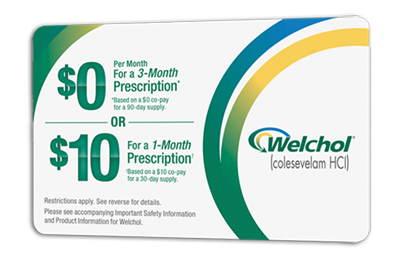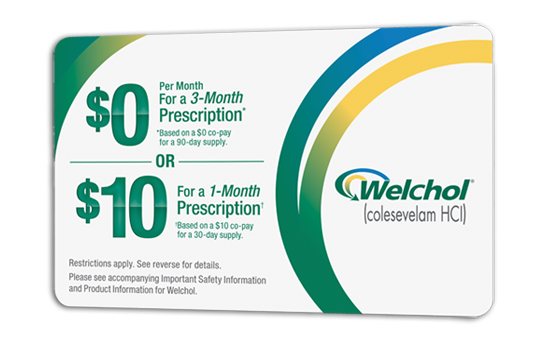About Type 2 Diabetes and High Cholesterol
Photos depict models, not actual patients or healthcare professionals.
Type 2 diabetes? High cholesterol? Or both? Welchol, along with diet and exercise, is the only FDA-approved medicine with a single active ingredient proven to lower both high blood sugar (A1C) and LDL-C or “bad” cholesterol in adults with type 2 diabetes and high cholesterol.
Learn more about type 2 diabetes and high cholesterol below:
WELCHOL is not for those with blood triglyceride levels of > 500 mg/dL
Type 2 diabetes is the more common form of diabetes1
95% of people with diabetes have type 2 diabetes2,3
About 90% of people with type 2 diabetes are overweight or obese3
Type 2 diabetes is often associated with obesity, family history, and physical inactivity.3 Common symptoms of diabetes may include urinating often, feeling very thirsty, feeling very hungry (even though you are eating), extreme fatigue, blurry vision, cuts/bruises that are slow to heal, and tingling, pain, or numbness in the hands and/or feet (type 2). However, some people with type 2 diabetes may not experience any symptoms.4
Type 2 diabetes in adults is a chronic condition that should be taken seriously
Type 2 diabetes can be associated with many serious health complications including5:
- Neuropathy (tingling, pain, numbness, or weakness in the feet and/or hands)
- Kidney disease
- Eye complications
- Skin complications
- High blood pressure
- Stroke
Welchol has not been shown to prevent heart disease, heart attacks, stroke, or any of the above risks.
Please see "What is Welchol® (colesevelam HCl)" and "Important Safety Information about Welchol" below.
The American Diabetes Association (ADA) explains that type 2 diabetes is a problem with the body that causes blood sugar levels to be high, either because the body doesn't make enough of the insulin hormone, or the body does not use insulin properly. When your body does not use insulin properly, this is called insulin resistance. At first, the pancreas makes extra insulin to make up for it. But, over time your pancreas isn’t able to keep up and can’t make enough insulin to keep your blood sugar levels normal. Type 2 diabetes is treated with lifestyle changes (healthy eating and exercise), oral medications (pills), and as a last option, insulin.1
A key to managing type 2 diabetes is controlling blood sugar levels
When managing type 2 diabetes, the ADA suggests these goals for most nonpregnant adults with diabetes. However, check with your doctor for the proper diabetes management for you.6-8:
- An A1C of <7%
- Blood sugar levels (before meals) of: 80 to 130 mg/dL
- Blood sugar levels (1 to 2 hours after starting a meal): Less than 180 mg/dL
A1C and blood sugar targets are different for every type 2 diabetes patient and depends on various factors, some of which are:
- How long the patient has had diabetes
- Age
- Other disease states the patient has
- A condition known as CVD or advanced microvascular complications
- The occurrence of low blood sugar (hypoglycemia)
One way your healthcare provider measures your blood sugar levels is with a hemoglobin A1C test. It shows your average blood glucose levels over the last 3 months. It is the best way to monitor your overall blood sugar levels during this time and see how well your diabetes treatment plan is working.7,9
Another step toward leading a healthy life with type 2 diabetes is learning some new habits. These include10:
- Choosing what, how much, and when to eat
- Getting physically active
- Checking your blood glucose (if your doctor prescribes it)
- Going to your doctors' appointments
- Learning all you can about diabetes
- Taking medicine as your doctor prescribes it
Remember to talk to your healthcare provider before making any changes to your diet or exercise plan.
WELCHOL is not for those with blood triglyceride levels of > 500 mg/dL
High cholesterol in the body may lead to other serious health problems11
Our bodies use cholesterol to make hormones, Vitamin D, and substances that help us digest foods. It's important to have the right balance of the different types of cholesterol in our bodies.
If there is too much LDL-C or "bad" cholesterol in your arteries, it can be called high cholesterol. If you have too much "bad" cholesterol, it's important to work with your doctor to lower these levels to reach your target goal.
Controlling your level of "bad" cholesterol is important. High levels of "bad" cholesterol may cause heart disease. "Bad" cholesterol builds up on the walls of the blood vessels over time. The blood vessels then become narrow. This may happen to the blood vessels going to the heart and brain. The result may be a heart attack, angina, stroke, or other diseases.
Welchol has not been shown to prevent heart disease, heart attacks, or any other of the above conditions.
Your diet and lifestyle changes may help you manage your cholesterol12
If your "bad" cholesterol levels are too high, diet and lifestyle changes may help you manage your cholesterol and keep it lower. The following may help you promote low cholesterol12:
- Make sure to stick to a heart-healthy diet
- Stay physically active
- Maintain a healthy weight
- Quit smoking (or don't start)
- If you have been prescribed cholesterol medicine, take it as prescribed
- Follow any other recommendations your healthcare provider may have
Remember to talk to your healthcare provider before making any changes to your diet or exercise plan.
Get Welchol Savings
Print your Welchol Savings Card and start saving today!‡
Based on a $0 co-pay for a 90-day supply or a $10 co-pay for a 30-day supply.‡Restrictions apply based on eligibility.


Based on a $0 co-pay for a 90-day supply or a $10 co-pay for a 30-day supply.‡Restrictions apply based on eligibility.
What is Welchol (colesevelam HCI)?
Welchol, along with diet and exercise, lowers LDL or “bad” cholesterol.
Welchol lowers LDL cholesterol in boys, and in girls who have had a menstrual period, ages 10 to 17 years, with a condition known as heterozygous familial hypercholesterolemia (a genetic disorder that causes high cholesterol).
Welchol, along with diet and exercise, also lowers blood sugar levels in adult patients with type 2 diabetes mellitus.
Welchol should not be used to treat type 1 diabetes or diabetic ketoacidosis.
Welchol has not been shown to prevent heart disease or heart attacks.
Welchol has not been studied with all anti-diabetes medications.
Welchol has not been studied in all types of hypercholesterolemia.
Welchol has not been studied in children younger than 10 years old or in girls who have not had a menstrual period.
‡Savings Card Offer: Eligibility Criteria and Terms & Conditions
To the Patient: You must present this card to the pharmacist along with your WELCHOL® (colesevelam HCl) prescription to participate in the program. For patients with commercial insurance, savings per prescription of WELCHOL will apply after the following out‐of‐pocket expenses are met: $10 per prescription for a 30‐day supply of WELCHOL or $0 per prescription for a 90‐day supply of WELCHOL. Offer may not be combined with any other program offer or discount for WELCHOL. Savings for WELCHOL are subject to a maximum benefit of $150 per 30‐day prescription or $450 per 90‐day prescription. If you have questions regarding your eligibility or benefits, or wish to discontinue participation, call (877) 264‐2440
(8 AM – 8 PM ET, Monday‐Friday). When you use this card, you are certifying that you understand the program rules, regulations, and terms and conditions. You are not eligible if you are enrolled in any state or federal health care program, including, but not limited to, Medicare Part D or Medicaid, VA, DOD, or TRICARE/CHAMPUS; or where taxed, restricted, or prohibited by law; or if you do not otherwise comply with the terms of this card. Further, you agree to discontinue using the card if you enroll in any state or federal health care program during the program period. Offer valid in US and Puerto Rico only.
To the Pharmacist: When you use this card, you are certifying that the patient is not enrolled in any federal, state, or other governmental programs for this prescription.
- Submit transaction to McKesson Corporation, using BIN #610524.
- If primary coverage exists, input card information as secondary coverage and transmit using the COB segment of NCPDP transaction. Applicable discounts will be displayed in the transaction response.
- Acceptance of this card is subject to LoyaltyScript® program Terms and Conditions posted at www.mckesson.com/mprstnc.
- Patient not eligible if enrolled in any state or federal health care program, including, but not limited to, Medicare Part D or Medicaid, VA, DOD, or TRICARE/CHAMPUS, or where taxed, restricted, or prohibited by law. Offer valid in US and Puerto Rico only.
- The LoyaltyScript® card is not valid for use with any other prescription drug discount or cash cards for WELCHOL. Claims submitted utilizing the program are subject to audit or validation.
- LoyaltyScript® is not an insurance card.
Cosette Pharmaceuticals, Inc., reserves the right to rescind, revoke, or amend this program, at any time, without notice.
Trademarks not owned by Cosette Pharmaceuticals, Inc., are property of their respective owners.
REFERENCES:
1. American Diabetes Association. Facts About Type 2. http://www.diabetes.org/diabetes-basics/type-2/facts-about-type-2.html. Updated October 27, 2015. Accessed June 18, 2019.
2. Centers for Disease Control and Prevention. National Diabetes Statistics Report: Estimates of Diabetes and Its Burden in the United States, 2017. Atlanta, GA: U.S. Department of Health and Human Services; 2017. https://www.cdc.gov/diabetes/pdfs/data/statistics/national-diabetes-statistics-report.pdf. Accessed June 18, 2019.
3. American Society for Metabolic and Bariatric Surgery. Type 2 Diabetes and Obesity: Twin Epidemics. https://asmbs.org/resources/weight-and-type-2-diabetes-after-bariatric-surgery-fact-sheet. Published November 2013. Accessed June 18, 2019.
4. American Diabetes Association. Diabetes Symptoms. http://www.diabetes.org/diabetes-basics/symptoms/. Updated August 28, 2018. Accessed June 18, 2019
5. American Diabetes Association. Complications. http://www.diabetes.org/living-with-diabetes/complications/. Accessed June 18, 2019.
6. American Diabetes Association. Checking Your Blood Glucose. http://www.diabetes.org/living-with-diabetes/treatment-and-care/blood-glucose-control/checking-your-blood-glucose.html. Updated October 9, 2018. Accessed June 18, 2019.
7. American Diabetes Association. Glycemic targets: Standards of medical care in diabetes - 2019. Diabetes Care. 2019;42(Suppl 1):S61-S70.
https://care.diabetesjournals.org/content/42/Supplement_1/S61. Accessed June 18, 2019.
8. American Diabetes Association. Standards of Medical Care in Diabetes - 2018; Diabetes Management Guidelines/Glycemic Targets. Diabetes Care 2018;41(Suppl 1):S1-S159. http://care.diabetesjournals.org/content/41/Supplement_1. Updated January 2016. Accessed June 18, 2019.
9. American Diabetes Association. A1C and eAG. http://www.diabetes.org/living-with-diabetes/treatment-and-care/blood-glucose-control/a1c/. Updated December 7, 2018. Accessed June 18, 2019.
10. American Diabetes Association. Taking Care of Your Diabetes. http://www.diabetes.org/living-with-diabetes/recently-diagnosed/where-do-i-begin/taking-care-of-your-diabetes.html. Accessed June 18, 2019.
11. National Institutes of Health: National Heart, Lung, and Blood Institute. High Blood Cholesterol. https://www.nhlbi.nih.gov/health-topics/highblood-cholesterol. Accessed June 18, 2019.
12. American Heart Association. Prevention and Treatment of High Cholesterol. http://www.heart.org/HEARTORG/Conditions/Cholesterol/PreventionTreatmentofHighCholesterol/Prevention-and-Treatment-of-High-Cholesterol_UCM_001215_Article.jsp. Updated April 30, 2017. Accessed June 18, 2019.
To contact us with questions or concerns about a Cosette Pharmaceuticals product,
please call us: 1-800-922-1038
WELCHOL is a registered trademark of Cosette Pharmaceuticals, Inc.
© 2022 Cosette Pharmaceuticals, Inc. CP-US-WC-001 06/22


